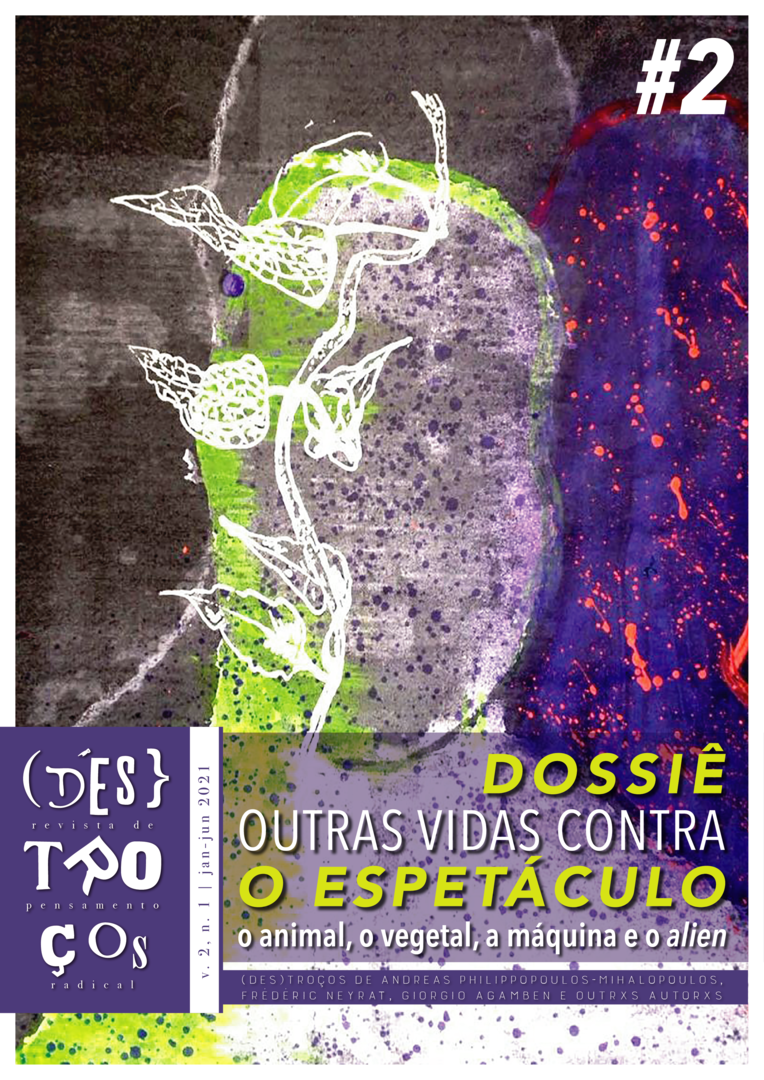Published 2021-08-25
Keywords
- plants,
- philosophy,
- metaphysics,
- capitalism,
- thought
Copyright (c) 2021 (Des)troços: journal of radical thought

This work is licensed under a Creative Commons Attribution-NonCommercial 4.0 International License.
How to Cite
Abstract
This paper reflects on the current interest of philosophy and sciences in general in plants, especially in view of its collective and decentralized character, which, far from guaranteeing any radical change in thought and in the world, may represent a deepening of the inherent displacing character of capitalism. Thus, starting from the complex (ir)relations between plants and philosophy, the text points to the metaphysical dimension that the debate about the supposed “intelligence” of plants involves today, which can be opposed to another model, difficult to be captured by capitalism, that of the plant-thinking, briefly outlined here.
Downloads
References
- BALUŠKA, František; MANCUSO, Stefano (eds.). Communication in plants: neuronal aspects of plant life. Berlin/Heidelberg: Springer, 2007.
- CANGUILHEM, Georges. Knowledge of life. Trad. Stephanos Geroulantos e Daniela Ginsburg. New York: Fordham University, 2008.
- CHAMOVITZ, Daniel. What a plant knows: a field guide to the senses. New York: Scientific American/Farrar, Staus & Giroux, 2012.
- CISLAK, Marzena et al. Swarming behavior in plant roots”. PLoS One, n. 1, v. 7, jan. 2012.
- GARZÓN, Francisco Calvo. The quest for cognition in plant neurobiology. Plant Signaling & Behavior, n. 4, v. 2, pp. 208-211, jul./ago. 2007.
- GILLESPIE, Michael Allen. Nietzsche’s final teaching. Chicago/London: University of Chicago, 2017.
- GRUBER, Karl. Agrobiodiversity: the living library”. Nature, n. 544, pp. S8-S10, abr. 2017.
- HALL, Matthew. Plants as persons: a philosophical botany. Albany: SUNY, 2011.
- JEFFERSON, Osmat A. et al. The ownership question of plant gene and genome intellectual properties. Nature Biotechnology, n. 33, pp. 1138-1143, 2015.
- KOHN, Eduardo. How forests think: toward an anthropology beyond the human. Berkeley/Los Angeles: University of California, 2013.
- KOLLER, Dov. The restless plant. Cambridge: Harvard University, 2011.
- MANCUSO, Stefano Mancuso; VIOLA, Alessandra. Brilliant green: the surprising history and science of plant intelligence. Trad. Joan Benham. Washington: Island, 2015.
- MARDER, Michael. Vegetality (manuscrito ainda não publicado).
- MILLER, Elaine. The vegetative soul: from philosophy of nature to subjectivity in the feminine. Albany/New York: SUNY, 2002.
- MORTON, Timothy. Ecology without nature: rethinking environmental aesthetics. Cambridge: Harvard University, 2009.
- MORTON, Timothy. Humankind: solidarity with nonhuman people. New York/London: Verso, 2017.
- TREVAWAS, Anthony. Plant behavior and intelligence. Oxford: Oxford University, 2014.
- VAN DEN HEUVEL, Martijn; HULSHOFF POL, Hilleke. Exploring the brain network: a review on resting-state fMRI functional connectivity. European Neuropsychopharmacology, n. 8, v. 20, pp. 519-534, ago. 2010.
- VIEIRA, Patricia; RYAN, John; GAGLIANO, Monica. The Language of plants: science, philosophy, literature, and cinema. Minneapolis: University of Minnesota, 2017.
- WOHLLEBEN, Peter. The hidden life of trees: what they feel, how they communicate. Discoveries from a secret world. Trad. Jane Billinghurst. Vancouver: Greystone, 2016.





